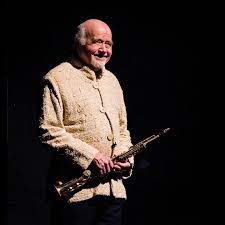72-year-old Paul Winter reflected on the serendipity that altered his likely course from becoming “a bad lawyer” to his career as a musician when we spoke last week. “In that time, none of us, at least in my realm, had any thought that music could be, let’s say, a suitable life path. You did it because you loved it, but we didn’t have the license back in those days to do what we loved.”


What gave Paul Winter license to indulge his youthful passion was the whirlwind of success he enjoyed as the 21-year-old leader of a jazz band that won First Place honors in an Intercollegiate Jazz Festival at Georgetown University in 1961. Winter was an English major at Northwestern destined for law school when his sextet of young Chicagoans impressed a panel of judges that included Dizzy Gillespie and John Hammond. Shortly thereafter, Hammond signed him to Columbia Records.
At the time, Winter was a hard-bop oriented saxophonist who loved Cannonball Adderley and patterned his group after the Miles Davis Sextet and The Jazztet, both of which he saw at the Sutherland Hotel on the South Side of Chicago. He and his trumpet-playing partner Dick Whitsell were so taken with Jimmy Heath’s 1959 recording The Thumper that on a whim they drove to New York City in search of the saxophonist, only to learn upon their arrival at the Half Note that he lived in Philadelphia. The following day they drove to Philly and knocked at his mother’s door, who showed them to the basement where Jimmy was practicing. Heath, who was then emerging from a decade in which his promising career had been sidelined by drug addiction and a prison term, sold them the seven charts he’d composed for The Thumper for $10 apiece. They were the original charts, but between them, Winter and Whitsell didn’t have $70 in cash, so they wired Paul’s father for assistance.

After recording their debut for Columbia in 1961, Jazz Premier: Washington, D.C., Winter was looking to capitalize on his group’s success but bookings were few and far between, so he took a long shot by applying to do a State Department-sponsored tour. World music, which Winter would become synonymous with a decade later, was not yet on his musical horizon. But his interest in cultural exchange had been awakened a few years earlier when he noticed an ad in Downbeat for a program called Jazz Lift which encouraged jazz fans to donate records for distribution behind the Iron Curtain. Winter joined in, and suddenly was getting mail from appreciative jazz fans in Russia and Poland. When he applied to the State Department, he had the Eastern Bloc in his sights, but instead was offered a six-month, 23-nation tour of Latin America, which he eagerly accepted.

Like established jazz greats Dizzy Gillespie, Gerry Mulligan, and Stan Getz, Winter was captivated by the sounds he heard in Brazil, and in the summer of ’62, he recorded Jazz Meets the Bossa Nova. In addition to the stimulation he got from music he heard on tour, Winter was impressed by the welcome his integrated sextet of three blacks and three whites was getting in foreign capitals. While in Lima, Peru, he wrote directly to President Kennedy to report that they’d “had wonderful receptions” and in addition to their concerts, they’d presented seminars and workshops that brought them into contact with young students. Winter thanked JFK for the State Department’s decision to allow his ensemble to represent the U.S., and encouraged him to engage in more of this kind of diplomacy.
The President apparently read the letter and remarked to White House Press Secretary Pierre Salinger, “Isn’t this interesting.” Then upon Winter’s return to the States in July, he received an invitation from Jacqueline Kennedy to perform at the White House in a series of concerts the First Lady was presenting of music “for young people, by young people.” Thus, on November 19, 1962, the Paul Winter Sextet became the first jazz ensemble ever to perform at 1600 Pennsylvania Avenue. And apropos of his enthusiasm for Jimmy Heath’s music, the first tune he played in the East Room was Heath’s arrangement of Milt Jackson’s, “Bells and Horns.” The tune was included on this collection of Music from the Kennedy White House.

Listen here to the interview I conducted with Paul on May 31. He recounts these formative experiences, and says that his return to Brazil in 1964 allowed him to become more deeply immersed in that nation’s indigenous music and inspired his eventual appreciation for African and Asian music, as well as the sounds of nature and wildlife. We spoke in anticipation of the concerts he’s playing at the Mahaiwe Theater in Great Barrington, MA , to celebrate the 50th anniversary reunion of the Paul Winter Sextet. Three of the group’s original members, pianist Warren Bernhardt, bassist Cecil McBee, and drummer Harold Jones, will be joined by trumpeter Marvin Stamm and baritone saxophonist Howard Johnson in the Berkshires on June 6 and 7 for performances of music by Heath, Tom McIntosh, John Lewis, and the Brazilians Dori Caymmi and Antonio Carlos Jobim .
